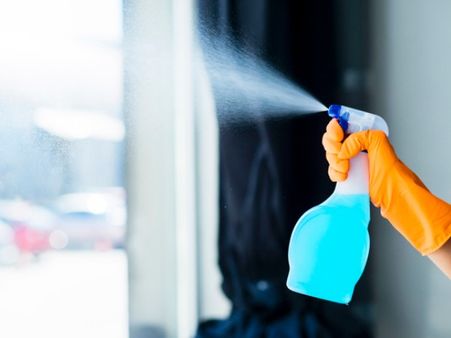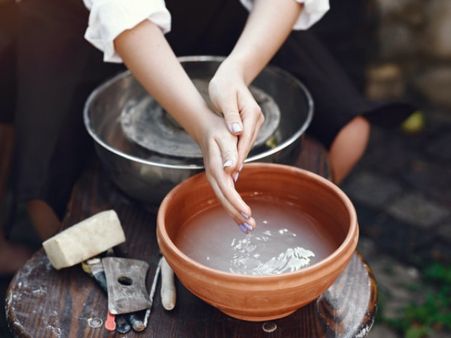Just In
- 10 min ago

- 9 hrs ago

- 10 hrs ago

- 11 hrs ago

Don't Miss
- Movies
 Palang Tod OTT Release Date: When & Where To Watch Ullu App Web Series Siskiyaan Season 3? Is New Season On Ca
Palang Tod OTT Release Date: When & Where To Watch Ullu App Web Series Siskiyaan Season 3? Is New Season On Ca - Sports
 DC vs GT IPL 2024: Why Shubman Gill Held Back Spinner R Sai Kishore Till 19th over?
DC vs GT IPL 2024: Why Shubman Gill Held Back Spinner R Sai Kishore Till 19th over? - Travel
 Escape to Kalimpong, Gangtok, and Darjeeling with IRCTC's Tour Package; Check Itinerary
Escape to Kalimpong, Gangtok, and Darjeeling with IRCTC's Tour Package; Check Itinerary - News
 Explained | Who Is Karen McDougal, Key Witness In Trump's Hush Money Trial?
Explained | Who Is Karen McDougal, Key Witness In Trump's Hush Money Trial? - Finance
 DCB Bank Q4 Results: PAT Grew 9% To Rs 156 Cr, NII Jumps 4.5%; Dividend Declared
DCB Bank Q4 Results: PAT Grew 9% To Rs 156 Cr, NII Jumps 4.5%; Dividend Declared - Technology
 OPPO Find X7 Ultra Camera Deep-Dive: Pushing the Boundaries of Photography on a Smartphone
OPPO Find X7 Ultra Camera Deep-Dive: Pushing the Boundaries of Photography on a Smartphone - Education
 MP Board Class 10th, 12th Results 2024, Know Alternative Ways to Check Your Result
MP Board Class 10th, 12th Results 2024, Know Alternative Ways to Check Your Result - Automobiles
 Aston Martin Vantage Launched In India At Rs 3.99 Crore
Aston Martin Vantage Launched In India At Rs 3.99 Crore
Coronavirus: How To Make Hand Sanitiser At Home
One of the most 'needed' things currently after protection masks, hand sanitisers are the next best thing to regularly washing your hands with soap. According to the Centers for Disease Control and Prevention (CDC), hand washing is the best preventive measure [1].

Due to the increased demand and lack of supply of hand sanitisers, spotting one at your regular medical shop or even at a supermarket can be quite difficult now, and shopkeepers are finding it difficult to keep up with the demand.
Please note that washing your hands with soap and water is the best and most effective form of protection. If soap and water are not available, use an alcohol-based hand sanitiser that contains at least 60 per cent alcohol [2][3].
However, I am here to tell you not to panic as it only takes three simple ingredients, which are all available online, to make a hand sanitiser of your own.

Hand sanitiser gel
Ingredients
for
hand
sanitiser
- Isopropyl alcohol (According to the CDC, your sanitiser mix must be at least 60 per cent alcohol to be effective. However, it is directed best to use 99 per cent) [4]
- Aloe vera gel
- Tea tree oil
- Mix 3 parts isopropyl alcohol to 1 part aloe vera gel.
- Add a few drops of tea tree oil to give it a pleasant scent.
- Mix well and use.
Note: Your regular vodka and whiskey are not going to work here.
Directions

Hand sanitiser spray (Recommended by WHO)
Ingredients for hand sanitiser
- Isopropyl alcohol
- Glycerol
- Hydrogen peroxide
- Distilled water
- Spray bottle [5]
- Mix 1 ⅔ cups alcohol with 2 teaspoons of glycerol (glycerol is available online).
- Mix in 1 tablespoon of hydrogen peroxide.
- Then, add ¼ cup of distilled or boiled water, which has been cooled down.
- Pour the solution into spray bottles.
- You can wet a paper towel with it as well and use that as a wipe.
- If you wish, add a few drops of essential oil.
Directions
Note: At least ⅔ of your final mixture has to be alcohol.

Dos

Don’ts
- Don't rely on DIY recipes based SOLELY on essential oils.
- Don't be conservative with your sanitiser, cover every surface of both hands entirely with the sanitiser and rub until dry.
- Don't use any hand sanitiser on greasy or dirty hands [8].
- Don't assume all anti-bacterial wipes will help [9].
- Don't expect baby wipes to work as well as handwashing or hand sanitiser.
- Don't touch your eyes, nose or mouth with unwashed hands.

On A Final Note…
While applying the hand sanitiser, thoroughly rub your hands together and make sure you cover the entire surface of your hands and all your fingers. Continue rubbing for 30 to 60 seconds or until your hands are dry [10].
Please note that, while alcohol-based hand sanitisers can quickly reduce the number of microbes on hands in some situations, it cannot eliminate all types of germs.

Frequently Asked Questions
Q. If 60 per cent alcohol is good, is 100 per cent better?
A. Surprisingly, no. Using 100 per cent alcohol will cause the alcohol to evaporate too quickly to effectively kill bacteria or viruses on your skin. Also, it would dry your skin out very quickly and cause it to become irritated.
Q. Does hand sanitizer expire?
A. Most commercial hand sanitizers are effective for a couple of years when stored in a dark and cold place.
Q. Why is alcohol the main ingredient in most hand sanitizers?
A. Alcohol is effective at killing different types of microbes, including both viruses and bacteria.

-
 disorders cureIndia May See A Covid Surge In January, Next 40 Days Crucial; Here Is How To Protect Yourself From COVID-19
disorders cureIndia May See A Covid Surge In January, Next 40 Days Crucial; Here Is How To Protect Yourself From COVID-19 -
 disorders cureCOVID Can Trigger Parkinson's Disease: Study
disorders cureCOVID Can Trigger Parkinson's Disease: Study -
 disorders cureCommon COVID Symptoms In Fully Vaccinated Individuals: What You Should Know
disorders cureCommon COVID Symptoms In Fully Vaccinated Individuals: What You Should Know -
 wellnessMild COVID Linked To Life-Threatening Blood Clots, Increased Risk Of Cardiovascular Disease; Study
wellnessMild COVID Linked To Life-Threatening Blood Clots, Increased Risk Of Cardiovascular Disease; Study -
 wellnessCOVID-19 Variants In India: New COVID Variant May Pose Threat To Elderly People
wellnessCOVID-19 Variants In India: New COVID Variant May Pose Threat To Elderly People -
 basicsCovid-19 Linked To Early Onset Of Periods: What You Need To Know
basicsCovid-19 Linked To Early Onset Of Periods: What You Need To Know -
 wellnessCOVID XBB Variants Of Omicron In India: What You Should Know
wellnessCOVID XBB Variants Of Omicron In India: What You Should Know -
 disorders cureNew Omicron Subvariant BQ.1 Detected In Maharashtra: What You Should Know
disorders cureNew Omicron Subvariant BQ.1 Detected In Maharashtra: What You Should Know -
 disorders cureOmicron BF.7 In India, Risk Of Fresh Wave During Diwali: What You Should Know
disorders cureOmicron BF.7 In India, Risk Of Fresh Wave During Diwali: What You Should Know -
 womenPriyanka Chopra Speaks On Climate Change, COVID, Poverty At The UN Sustainable Development Goals 2022 Moment
womenPriyanka Chopra Speaks On Climate Change, COVID, Poverty At The UN Sustainable Development Goals 2022 Moment -
 wellnessCoronavirus Residues Might Be Causing Long COVID: New Study
wellnessCoronavirus Residues Might Be Causing Long COVID: New Study -
 art cultureRenowned Spanish Author Javier Marias Passes Away Due To Lung Infection Post COVID-19
art cultureRenowned Spanish Author Javier Marias Passes Away Due To Lung Infection Post COVID-19


 Click it and Unblock the Notifications
Click it and Unblock the Notifications



